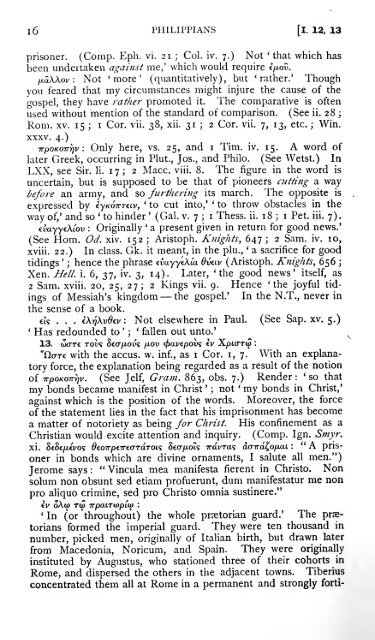Philippians and Philemon - MR Vincent - 1906.pdf
Philippians and Philemon - MR Vincent - 1906.pdf
Philippians and Philemon - MR Vincent - 1906.pdf
Create successful ePaper yourself
Turn your PDF publications into a flip-book with our unique Google optimized e-Paper software.
6<br />
PHILIPPIANS [l. 12, 13<br />
1<br />
. been undertaken against me,' which would require .<br />
Not<br />
prisoner. (Comp. Eph. vi. 21 ; Col. iv. 7.) Not 'that which has<br />
'more' (quantitatively), but 'rather.' Though<br />
you feared that my circumstances might injure the cause of the<br />
gospel, they have rat/ier promoted it. The comparative is often<br />
used without mention of the st<strong>and</strong>ard of comparison. (See ii. 28 ;<br />
Rom. XV, 15 ; i Cor. vii. 38, xii. 31 ; 2 Cor. vii. 7, 13, etc. ; Win.<br />
XXXV. 4.)<br />
:Only here, vs. 25, <strong>and</strong> i Tim, iv, 15, A word of<br />
later Greek, occurring in Plut., Jos,, <strong>and</strong> Philo, (See Wetst,) In<br />
LXX, see Sir, li. 1 7<br />
; 2 Mace, viii. 8, The figure in the word is<br />
uncertain, but is supposed to be that of pioneers cutting a way<br />
before an army, <strong>and</strong> so furthering its march. The opposite is<br />
* expressed by,' to cut into,' to throw obstacles in the<br />
way of,' <strong>and</strong> so ' to hinder ' (Gal. v. 7 ; i Thess. ii. 18 ; i Pet, iii, 7),<br />
€£ : Originally ' a present given in return for good news.'<br />
(See Horn, Od. xiv. 152 ; Aristoph. Knights, 647 ; 2 Sam. iv. 10,<br />
xviii. 22.) In class. Gk. it meant, in the plu., * a sacrifice for good<br />
tidings ' ; hence the phrase tvayytkia^ (Aristoph. Knights, 656 ;<br />
Xen. Hell. i. 6, 37, iv, 3, 14). Later, 'the good news' itself, as<br />
2 Sam. xviii. 20, 25, 27; 2 Kings vii. 9. Hence 'the joyful tid-<br />
ings of Messiah's kingdom — the gospel' In the N,T., never in<br />
the sense of a book.<br />
/ iv<br />
«'5 . . . (.-](. : Not elsewhere in Paul. (See Sap, xv. 5,)<br />
* ' Has redounded to ; fallen out unto,'<br />
'<br />
13. £ :<br />
with the accus, w, inf., as i Cor, i, 7. With an explanatory<br />
force, the explanation being regarded as a result of the notion<br />
' of. (See Jelf, Gram. 863, obs. 7,) Render : so that<br />
my bonds became manifest in Christ ; not ' ' my bonds in Christ,'<br />
against which is the position of the words. Moreover, the force<br />
of the statement Hes in the fact that his imprisonment has become<br />
a matter of notoriety as being for Christ. His confinement as a<br />
Christian would excite attention <strong>and</strong> inquiry. (Comp. Ign. Smyr.<br />
xi. /?^/? " : prisoner<br />
in bonds which are divine ornaments, I salute all men.")<br />
Jerome says " : Vincula mea manifesta fierent in Christo, Non<br />
solum non obsunt sed etiam profuerunt, dum manifestatur me non<br />
pro aliquo crimine, sed pro Christo omnia sustinere."<br />
iv :<br />
'In (or 'throughout) the whole prietorian guard,' The prae-<br />
torians formed the imperial guard. They were ten thous<strong>and</strong> in<br />
number, picked men, originally of Italian birth, but drawn later<br />
from Macedonia, Noricum, <strong>and</strong> Spain. They were originally<br />
instituted by Augustus, who stationed three of their cohorts in<br />
Rome, <strong>and</strong> dispersed the others in the adjacent towns. Tiberius<br />
concentrated them all at Rome in a permanent <strong>and</strong> strongly forti-





